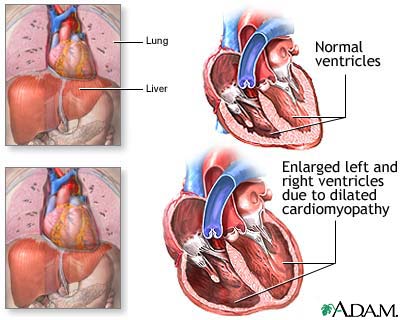We read very often about cardiovascular disease, about heart failure,
heart attack, stroke and many other disorders, but we don’t know for
sure
what is cardiovascular disease, why and how it occurs and what changes occur in our body. Next, we will try to explain
what is cardiovascular disease in the society of nowadays and how much did medicine advanced in this research field.
What is cardiovascular disease
A question that scientists succeeded to answer but failed to cure.

Nowadays, when more and more people are suffering from heart disease
we may wonder what is cardiovascular disease and why is it the first
cause of death in most of the countries. We invest millions of dollars
on research, looking and testing a lot of drugs, we even found out what
is causing AIDS (and we succeeded to transform it in a „chronic”
disease) and many other disease with strange names. But all the time
there is a new disease, a new virus or bacteria that gives us trouble to
treat and sometimes it feels that the more drugs we discover, the more
diseases occur. Even so, the most frequent cause of death are
cardiovascular disease, a group of diseases that seem to be entirely
understood, with lots of article and medical research, that could make
some wonder what else is left to discover. The truth it is far from
being so, as with the medical treatment we have at this moment we can
only slow down these disease and not cure. Even the prophylaxis of
cardiovascular disease is not very promising as we live in the century
of unhealthy foods, McDonald’s food, alcohol consumption, smoking,
stress, sedentariness and we spend all out time watching TV and working
on computer.
After we established how important these diseases are, now let’s finally find out what is cardiovascular disease.
What is cardiovascular disease? A group of disorders that affect heart, brain and blood vessels.
The most frequent cardiovascular diseases:
- hypertension: high blood pressure affects both brain and heart as it
can determine bleeding (stroke) or small infarcts in the brain and also
determine or worsen heart failure. Beside heart and brain, hypertension
also affects eyes and kidneys.
- heart valve disease: valves fail to close or open properly and in time they can cause heart failure,
- irregular heart beats can cause fainting, shortness of breath, chest pain, fatigue or even heart failure,
- other heart tissues disorders: infection, metabolic disorders that
affect heart (different disorders that can determine deposits of some
substances in heart tissues like iron, copper etc)
- strokes: a blood cloth can block one of the brain blood vessels and
make a variable brain area to die or a blood vessel may break and let
blood flow into the brain (this usually occurs in patients with
hypertension or with blood vessel malformations).
- atherosclerosis: fat deposits in the blood vessels wall that in time
can determine strokes, heart attack, chest pain, arterial disorder with
legs pain during walking and even during rest, in advanced cases,
neurologic symptoms: dizziness, fatigue, fainting, drowsiness, memory
and concentration dysfunction etc.
Now that we found out
what is cardiovascular disease, let’s see how is treated. As we’ve seen, it is easy to answer
what is cardiovascular disease,
but is difficult to treat it. Treatment has two parts and two partners:
the patient and the doctor. The patient should respect a healthy diet,
with no salt, fats and sweets, attend regular exercise (jogging, running
or any kind of sport), no smoking or alcohol consumption, keep a normal
weight, control blood pressure and blood sugar. Doctors have a large
number of drugs they can use, the purpose of this treatment is to slow
down the disease and treat other disorders that may worsen
cardiovascular diseases like high blood pressure, diabetes, high level
of fats in the blood, infections, irregular heart beats etc. It is also
important to prevent other cardiovascular events from happening, that’s
why antiplatelet medication like aspirin is prescribed in patients that
are suffering from cardiovascular disease.
We hope this article can offer a brief answer to the question what is
cardiovascular disease and why this medical problem is so important in
nowadays society.





